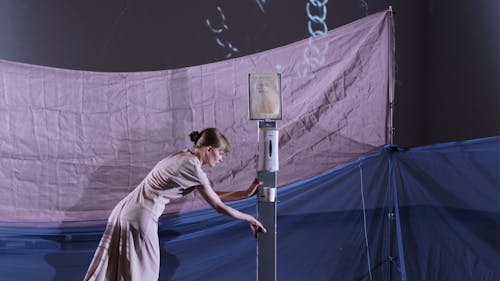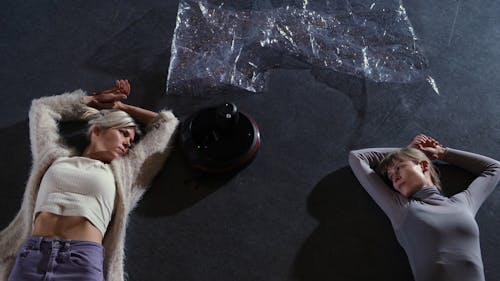Interview: Exploring the machinic echoes of contemporary pop with Jenny Hval
Jenny Hval needs no introduction. She has spent the last 15 years cultivating a broad collection of pop sounds: from the noir discordance of Innocence is Kinky (2013) and the brooding sanguine whispers of Blood Bitch (2016), to the galloping electro-pop of The Practice of Love (2018) and the carefree blue-sky sounds of Classic Objects (2022), which was performed live at Rewire 2022. At this year’s festival edition, she brings forth a new audiovisual performance, I Want to Be A Machine. Said performance unfolds as a rumination on the machinations of contemporary pop that responds to playwright and poet Heiner Müller’s Avant-garde play Die Hamletmaschine (1977). We caught up with her ahead of her performance at Rewire 2024 to discuss the changing shape of contemporary pop.
Your new performance, I Want To Be A Machine responds to Die Hamletmaschine (1977) by the German playwright and poet Heiner Müller – a play which sought to make an avant-garde, performative machine out of Shakespeare’s Hamlet. What was it about this piece that first drew you in?
I was very young when I first read and studied this play – it was part of my very first theatre subject at University – so it opened up a world of performance studies for me, ways to criticise and consider art history. But it has stuck with me because I identify with it, the way it rips open the theatrical illusion and the way the characters Hamlet and Ophelia are both their old selves and something entirely contemporary. They remind me of pop artists, because we “know” them, they are so famous, and yet they are nonchalant, tired, and misplaced, like the cast of Triangle of Sadness (2022) when they are stuck on the desert island.
How has the world of music and pop specifically moved towards a more machinic embrace? Are there positives as well as negatives?
I think the world in general (and also music) has moved towards the acceptance that machines enhance the human experience (while steadily forgetting how the human experience needs to engage with face-to-face interactions). We allow ourselves to think that the algorithms know us and can describe our existence. Positives: new illusions, new ways to work faster with less effort, efficiency, accessibility. Negatives: commercialism and cynicism, the illusion of knowing what will engage with an audience and create emotional value, a reliance on numbers (streaming numbers, ticket sales) to define. Also, let’s not forget the pandemic, forcing us to weigh health against human intimacy and public space.
In the contemporary context where vocaloid pop stars such as Hatsune Miku see success and there is a rampant rise in AI-generated replications of the human voice, how do you envision the role of the pop singer mutating in the coming years? And how do you personally relate to that role of “pop musician” in your practice?
The role of the pop singer – I don’t know. So much has already happened. The voice has already mutated very much. According to vocal coaches, young singers now learn to sing from listening to heavily autotuned pop music recordings, and as a result the timbre of their unprocessed voices already sound ”processed.” In that sense, everything we “fear” has already happened. It’s about how we learn, how we listen to music. I wonder, can AI-replications of the human voice make us “more” human again? I’m relating to the role of pop musician in my work for sure, but I’m a low-budget one. I don’t necessarily go through all the steps of production and post-production that many mainstream pop recording artists would. Things are quite lo-fi in my world, and perhaps I also allow my other work – writing, and recently a couple of radio projects – to influence my recordings.

Your preface for I Want To Be A Machine touches on the idea of “the apocalyptic world of current politics” and the role of art and music within it. In what ways has working on this project brought about a sense of hope – or concern – for you?
This question is difficult. I have to say I don’t know. I wrote that phrase because I feel like I’ve been a musician for a while now, and I feel like music has been seen as less and less valuable to society throughout my career. This has happened hand-in-hand with the rise of extreme rightwing politics. And during the last eight years or so we have been living in what sometimes feels like the political end times. This must influence everyone’s work, right?
Is there a sense of hope? Music always has hope for me, it is a parallel existence, closer to life and death than the story we live in that isn’t music. And in I Want To Be A Machine, there is a lot of music. It could be seen as interdisciplinary, but everything that isn’t music – scenography, visual material, movement, fabrics, words – has sprung from the music.
Aside from the aforementioned Müller play, which other sonic, academic, or literary influences have played a part in forming I Want To Be A Machine?
I think that this piece is much less influenced by a myriad of material than most of my other work. I’ve been in a phase of very little input over the past three years or so, maybe I’ve been interested in other things – dog training for example – maybe I’ve been a bit burnt out. I’ve struggled to find space for listening to new music, reading, and really taking anything in. I was surprised that I could go into composing this music with such joy, actually. Maybe that’s why I’ve chosen the title I Want To Be A Machine, because it sounds like something a modern Pinocchio (or Hamlet) would say. The old Pinocchio was a doll wanting to be a real human, but perhaps the modern subject is a human wanting to retreat.

Jenny Hval performs at Rewire 2024 on Saturday 6 April